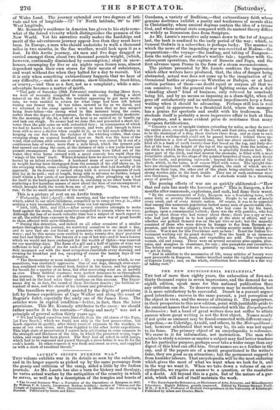LAURIE'S SECOND BURMESE WAR. *
Tins volume exhibits war in its details as seen by the subaltern, and in its larger aspects as picked up by the same personage from the gossip and criticism of the camp, aided a little by the Indian journals. As Mr. Laurie has also a turn for history and theology, he varies actual warfare by the antiquities of the country in which he serves, as well as by a description of the temples and tenets of
• The Second Burmese War: a Narrative of the Operations at Rangoon in 1852. By Willisun F. B. Laurie, Lieutenant Madras Artillery; Author of "Orissa and the Temple of Jagannath," Ste. With Illustrations by °dicers of the Force serving in Burnish. Published by Smith and Elder.
Guadama, a variety of Budhism,—that extraordinary faith whose genuine doctrines exhibit a purity and tenderness of morals akin to Christianity, whose ancient dogmas contain the idea of a triune God, and whose actual state compared with its ancient theory differs as widely as Romanism does from Scripture. As Mr. Laurie's narrative only comes down to the 1st of August last, the book is confined to the early period of the war ; which, as General Godwin is a subscriber, is perhaps lucky. The manner in which the news of the impending war was received at Madras—the preparations—the voyage—the landing, and taking of Rangoon— form the subjects of our author's warlike tale ; together with the subsequent operations, the capture of Bassein and Pegn, and the first advance upon Promo in the form of a steam reconnoissance.
The picture presented by Mr. Laurie confirms the impression which other writers have produced, that, the idea of danger being abstracted, actual war does not come up to the imagination of it. Occasional battles or sieges—as Waterloo or Badajos, or at least certain portions of them—no doubt equal or surpass all that we can conceive ; but the general run of fighting seems often a dull "standing about" kind of business, only relieved by somebody being hit, and by no means so imposing as a sham-fight, when all goes off satisfactorily and no unforeseen impediments keep a force waiting when it should be advancing. Perhaps still less is real war equal in appearance to a theatrical field, where the manager has a genius for spectacle and credit with his tradesmen. The stockade itself is probably a more impressive affair to look at than its capture, and a more evident piece de resistance than many European fortifications. "Conceive a row of upright timbers extending for miles, as they do rimed the entire place, except in parts of the North and East sides' each timber lit to be the mainmast of a ship, these timbers three deep, and so close to each other that a walking-stick could not be passed between ; behind these up- right timbers is a row of horizontal ones, laid one above another ; and be- hind all is a bank of earth twenty-four feet broad on the top, and forty-five feet at the base ; the height of the top of the uprights, from the bottom of the ditch in which they are deeply planted, is generally fourteen feet The upper part of the ditch, and that nearest the stockade, is filled with a most formidable abattis, in the shape of the pointed branches of trees, stuck firmly into the earth, and pointing outwards ; beyond this is the deep part of the ditch, which, in the rains, is of course filled with water. The upright tim- bers are strengthened with connecting planks, the ends of which are in- serted on their tops, the other end of the plank being similarly secured by strong wooden pins in the bank inside. They are of such enormous mas- sive thickness, that firing at the face of a stockade would be a throwing away of powder."
The passing effects of war are as quickly obliterated—" How that red rain has made the harvest grow." This is Rangoon, a few months after cannonade, explosions and sack, had done their worst. "By the commencement of July, Rangoon was a flourishing town, with some sixty or seventy thousand inhabitants. People to be seen of nearly every creed, and of every Asiatic nation. Of course, it was to be expected that among this numerous population lurked many men of questionable cha- racter. There was the slippery deceit, who had come to try his hand, perhaps, upon a commissariat bullock; there was the wily gambler, who had come to cheat those who had money about them ; there was a spy or two, who had just dropped in to look quietly at the state of affairs, and -see whether our gallant General was on the (lui rive or not; but the majority consisted of those who were driven by hunger to flee from Burmese op- pression, and who now rejoiced to live in certain security under British pro- tection. Was it not for this Providence sent us here ? Is not the Indian Go- vernment working out its grand destiny ? Near the beach is an immense bazar, Where fish, fruit, meat, and vegetables are sold. The vendors are women, old and young. There were on several occasions pine-apples, plan- tains, and mangoes in abundance, for sale ; also pumpkins and cucumbers. The bekties and mangoe fish are, generally speaking, very inferior to what we get in India.
"And in addition to the necessaries of life, many articles of luxury were now procurable in Rangoon. Justice breathed under the vigilant magistracy of Captain Latter; and', on the whole, civilization here seemed in a fair way of taking root."


























 Previous page
Previous page